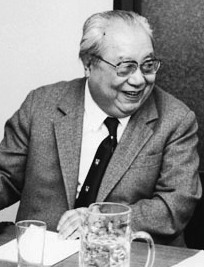Fei Xiaotong
Fei Xiaotong ( Chinese 费孝通 , Pinyin Fèi Xiàotōng , W.-G. Fei Hsiao-t'ung ; born November 2, 1910 in Wujiang ; † April 24, 2005 in Beijing ) was a Chinese scientist and professor of sociology , anthropology and ethnology . His studies of ethnic minorities in China pioneered anthropological research in the People's Republic of China . He held the chair of sociology at Peking University .
Life
Fei Xiaotong studied sociology and ethnography with SM Shirokogoroff from 1930 to 1935 at Yanjing University and then at Tsinghua University in Beijing . He then studied under Bronisław Malinowski at the University of London , where he obtained his PhD in 1938. He returned to China. Much of the country was occupied by Japan , and he became professor of social anthropology in Kunming, Yunnan Province - a city that was not under Japanese occupation and a haven for many people .
His first field research took him to the mountainous regions of today's Guangxi Autonomous Region of the Zhuang nationality. His first major publication, Peasant Life in China, which appeared in English in 1938, was the result of these studies.
After the founding of the People's Republic, Fei played an important role as an outstanding intellectual in China's intellectual life. In 1951 he became Deputy Rector of the Central Nationalities University and in 1954, as a member of the Nationalities Commission, he was a member of the First National People's Congress . In 1957 he was criticized as a legal deviator. He was ill-treated and forced to do physical labor during the Cultural Revolution . But even before Mao's death, he was able to receive foreign guests as a professor at the Central National University. After 1978 he had the task of rebuilding the Chinese social sciences, especially sociology and ethnology. In 1980 he was one of the judges in the trial of the " Gang of Four ". He then played a key role in developing the reform policy for agriculture, the success of which was the basis for China's dynamic economic development in the decades that followed.
He had several - mainly representative functions - in the political system of China, among other things he was deputy chairman of the VI. Political Consultative Conference of the Chinese People and Honorary Chairman of the Central Committee of the Democratic League of China .
From 1982 until his death he was professor of sociology at Peking University , from 1985 until his death also director of the local sociological institute.
Works
- Globalization and cultural self-awareness. Springer, Heidelberg / New York / Dordrecht / London / Berlin 2015, ISBN 978-3-662-46647-6
- From the Soil ( Xiangtu Zhongguo , 《鄉土 中國》). University of California Press 1992. ISBN 0-520-07796-2 . (New edition, originally: 1947).
- Toward a People's Anthropology ( Maixiang renmin de renlei xue , 《迈向 人民 的 人类学》). New World Press, Beijing 1981.
- Chinese Village Close-Up ( Sanfang jiangcun , 《三 访 江村》). New World Press, Beijing 1983.
- 社会学 文集Shehui xue wenji (Collected Writings on Sociology). 天津 人民出版社Tianjin renmin chubanshe (Tianjin People's Publishing House). 天津 Tianjin 1985.
- Volume 1: 民族 与 社会Minzu yu shehui (Ethnos and Society). 159 pages.
- Volume 2: 从事 社会学 五 十年Congshi shehui xue wushi nian (50 years in sociology). 169 pages.
- Volume 3: 社会学 的 探索Shehui xue de tansuo (The Sociological Research). 319 pages.
- Volume 4: 论 小 城镇 及 其他Lun xiao chengzhen ji qita (About small towns, large communities and others). 279 pages.
- 民族 研究 文集Minzu yanjiu wenji (Collected publications on nationality research). 民族 出版社Minzu chubanshe (nationality publisher). 北京 Beijing 1988. ISBN 7-105-00079-1 . 2 + 4 + 512 pages.
Web links
- Literature by and about Fei Xiaotong in the catalog of the German National Library
- Stephan Feuchtwang: Fei Xiaotong: Anthropologist and reformer ( Guardian , May 5, 2005) An obituary.
| personal data | |
|---|---|
| SURNAME | Fei Xiaotong |
| ALTERNATIVE NAMES | v = 费孝通 (Chinese) |
| BRIEF DESCRIPTION | Chinese sociologist, anthropologist and ethnologist |
| DATE OF BIRTH | November 2, 1910 |
| PLACE OF BIRTH | Wujiang (Suzhou) |
| DATE OF DEATH | April 24, 2005 |
| Place of death | Beijing |
